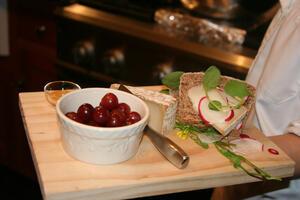Kosher, Gourmet, and Underground
Itta Werdiger Roth, a professional chef, founded The Hester, an underground, word-of-mouth music café/speakeasy/supper club in Brooklyn that fuses local food, music, and Jewish conversation. The venue—a Brooklyn home turned restaurant—connects people from several worlds, Jewish and non-Jewish, by introducing them to gourmet kosher food, music, and culture. We were able to catch a moment with Itta, a busy Australian expatriate and mother of two, in between her food preparations.
Tell us how you cooked up the idea for The Hester.
The Hester brings together two of my greatest passions: food and music. I’ve worked in the food industry for the last five years doing lots of different jobs, and I had become exhausted. I love working hard, but I wanted something I could call my own and be as creative as I dared. I’ve always loved throwing parties and making food for people, so I made it my job! And let's face it, really good food is more enjoyable when you’re listening to quality music (and vice versa); so that’s how the idea was born.
Why call it The Hester?
Kate Hester was the name of a real woman in the early 1900s who, having lost her liquor license, used to yell, “Speak easy boys!” to quiet the patrons. Another reason is actually straight from the Torah. G-d says, "Anochi hastir astir panai" - "I shall surely hide My face." (Deut. 31:18). So Hester (hastir) actually means “hidden.” Perfect for a speakeasy, if you ask me!
How is your approach to cooking and entertaining different than the average Hassidic woman’s?
I'm not sure what you mean by an “average Hassidic woman.” I think the term carries some prejudicial baggage with it. If you are asking me whether I cook things other than gefilte fish, lokshen kugel and cholent, then, yes, my approach is different. For one, I mostly cook meatless meals. And just for the record, Hassidic households aren't just about kishke and latkes cooked by a beleaguered SAHM (Stay At Home Mom). Women do work outside the home. And Hassidic men cook too! And as for the food I cook, I tend to use fresh, local, and organic ingredients, little to no processed foods, lots of legumes, whole grains, and wild fish with influences ranging from Indian, Japanese, Middle Eastern, Eastern European and Mediterranean or whatever the heck I feel like.
Why is what you’re doing important? What kind of impact are you having on the Jewish world? The larger world?
I’ll start with our food practices: All the food is seasonal, and the produce is mostly local and organic. It’s important for people to learn how to cook this way because it betters the environment, the economy, and the body. I also don't use any disposables, including the glasses, dishes, cutlery, napkins, and baking trays. I hope both the guests and the staff notice and realize that this is actually very feasible.
To answer your question about our impact on the Jewish world: The Hester introduces new music, linking many Jewish musicians with a mostly Jewish audience. Since The Hester connects Jewish singles, I’m hoping that there will soon be couples who meet at The Hester, get married, have lots of babies, and live happily ever after, which means the continuation of the Jewish people. And as for the larger world: There are also plenty of people who come who are not Jewish. It's a very warm space that welcomes all. The Hester is more than just a super club or a DIY space; it has the potential to be a community.
Who are the people who have attended The Hester events in the past? Whom are you trying to reach? How many and how frequent are The Hester gatherings?
The Hester happens about once a month, and we get about 70 people on average.
Diversity is really important to us. We have Hasidic people who come to eat the kosher food and hear new music; locals who enjoy going out in general and love the convenience of a close, happening place; some older individuals who just like to sit back, sip a scotch and enjoy the music over a plate of aged cheese; married couples with kids who hire a babysitter and make it a big, fun night out; hipsters or foodies who just want to check out something new and underground; groups of friends who want to catch up; or singles who are on the prowl. And then of course each band brings it’s own crowd: current friends or future fans. You name it!
What have been some of the greatest joys as you’ve developed The Hester?
Seeing guests interact with each other. The lounge area really gets cozy, and people who have never met before end up sharing their food.
Can you share a colorful story or anecdote about the people or events involved in The Hester?
For our last event, every single staff member was female, and it made me proud. We had one hostess, two servers, one dishwasher, two cooks, two bartenders, and of course me. (I also can't forget to thank my husband who does help out with different things but might not appreciate my calling him a "staff member.") Also, since we observe the laws of kol isha, we do not have female vocalists. One of our last bands, The Grasshoppers, had a female drummer and bass player as well as two male and female vocalists. The Grasshoppers were sensitive to our observance, agreeing to completely adapt their performance to suit The Hester's commitment of adhering to a certain level of Jewish law. I think this is such a strong example of what The Hester is all about: it's about people working together, about unity, about extremist religion chilling the hell out (most religious people would never stand for a band with ANY women in it, even though the law is specifically about female vocalist). So thank you to The Grasshoppers, you guys are beautiful people! And hooray for The Hester!
How is ROI related to The Hester initiative? What is ROI? Did you attend the ROI summit? If so, tell us about it…
ROI was founded in 2005 by philanthropist Lynn Schustermann. Today it’s part of the Charles and Lynn Schusterman Philanthropic Network. The ROI summit is an annual gathering of hundreds of young, Jewish innovative thinkers from around the world. As a member of this community, I am linked to 800 other Jewish leaders, innovators, and professionals from 500 countries on six continents. Being around all these amazing people inspired me to focus internally and figure out why I was there and what my project had to offer the world. I’m hoping that all of us, wherever we are, will be able to take a bit of that back and spread it as far we can.
If you're interested in finding out more about Itta or The Hester, go to The Hester Facebook page. You can also contact Itta at thehesterclub@gmail.com
This post is the fifth in a series on "Jewesses with Attitude" -- Women Who Have Inspired Change.









Being a proponent and producer of private house concerts/supper clubs, I was delighted to read about The Hester. Until the part about strict observance of kol isha laws. There's tradition and then there's repression.